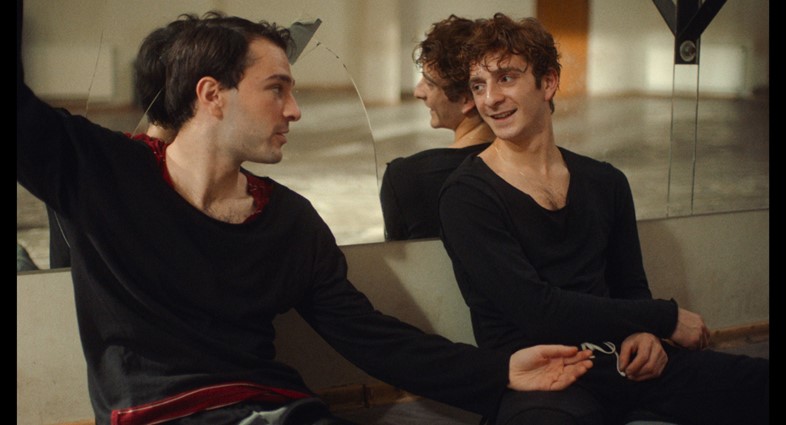Levan Gelbakhiani’s new movie And Then We Danced sparked violent protests in Georgia – where it’s set – from right-wing groups incensed by the film’s gay love story
- TextNick Levine
And Then We Danced is a great coming-of-age story because it’s also a great ‘coming out’ story. Set in the intense world of Georgian dance, where old-fashioned masculinity is rigidly upheld and homosexuality means expulsion from the troupe, it follows talented young dancer Merab (Levan Gelbakhiani) as he realises his romantic feelings for his newest rival (Bachi Valishvili). Writer-director Levan Akin follows their illicit relationship with tenderness and a very contemporary sense of urgency – in an especially affecting scene, we see them dancing longingly to Robyn’s Honey.
When And Then We Danced opened in Georgia last year, it sparked violent protests from right-wing groups incensed by the film’s gay love story. Gelbakhiani, whose moving performance builds towards an astonishing dance-based final scene, freely admits he turned down the role several times because homosexuality is still a taboo topic in much of Georgia. Here, he discusses the challenges posed by making the film and the positive effect it’s had on his country’s LGBTQ community.

Nick Levine: How difficult was it to shoot this film in Georgia given the subject matter?
Levan Gelbakhiani: It was quite difficult because we would lose locations at one day’s notice. And people, as soon as they found out the topic, they’d say: ‘I don’t want to be part of the project.’ The producer tried to make it so that the director and me and my co-stars didn’t feel any of these outside pressures. But even now, a lot of people [who worked on the film] don’t want their name on the credits – they want to be anonymous.
Nick Levine: Has starring in the film made life difficult for you personally in any way?
Levan Gelbakhiani: It’s not difficult for me now. I mean, I can see a lot of hateful comments on social media and in my everyday life maybe I get a little bit of weird eye contact on the street. But generally it’s not something I’m afraid of – I don’t have to hide away or anything. And the reactions we’ve got [are] kind of 50/50. There’s a lot of people who’ve been really supportive and feel really proud about the movie. Then there are other people who don’t like the movie and say they want to kill us.
Nick Levine: How did you feel when the film sparked protests in Georgia?
Levan Gelbakhiani: It was so terrible because people just wanted to get into the cinema and see the film, but there was this bunch of people outside blocking the entrance. One girl got injured because someone threw their phone – she was bleeding, it was terrible. But people still managed to see the movie and they liked it. There were a lot of protests, though – they had this, like, ‘shame corridor’, and people had to walk through the shame corridor to go to the cinema. And there were a lot of police officers in the screening room with weapon detectors so it was pretty intense.
Nick Levine: Is this a very important film for Georgia’s LGBTQ community, do you think?
Levan Gelbakhiani: I think it’s quite important, definitely. A lot of community members tell me they’re proud of the film. No one had made something like this in Georgia before. And members of the community tell me they know they’ve got more support now because they saw the way people supported the film. I think we kind of opened some doors for community members.
Nick Levine: Do you have a favourite scene in the film?
Levan Gelbakhiani: I can definitely say I have several favourite scenes, but especially the scene with the Robyn song and final scene and the ‘night out’ scene. Basically like every scene!
Nick Levine: Sometimes club scenes in films are really unconvincing, but yours feels so authentic and exciting. What’s the club scene like in Georgia?
Levan Gelbakhiani: The club scene in Georgia is really cool – we get DJs coming from Berlin and Amsterdam and all over. And we filmed that scene in one of the top clubs in Georgia. But in Georgia, the club is not just a place to go and have fun and listen to music; it’s more like a movement. People are united around the club and it’s become more like an activism thing. It’s a space for queer people to escape from the everyday problems in their life. A lot of queer people from countries nearby come there to dress how they like and be who they like.
Nick Levine: Why do you think this film has made such an impression on people from all over the world?
Levan Gelbakhiani: Because it’s a good movie! No, I think maybe it’s because a lot of people can identify with different characters from the movie. And for the international audiences, it’s something new and exotic because maybe they never saw Georgian culture before. The story is amazing and I think the whole movie is really something quite beautiful. You get a sense of empathy towards the characters when you’re watching this movie.
Nick Levine: Obviously queer people will respond to the film, but I don’t think you need to be LGBTQ to relate to these characters.
Levan Gelbakhiani: Definitely. I think it’s a film that everybody can identify with, even if you’re not from the queer community. You can be straight but enjoy this gay love story – I mean, why not? Everyone can relate to a love story and feel these highs and lows – it’s a really beautiful, universal thing.
And Then We Danced is in cinemas now.











